
Katherine Spillar Fights for Feminism
Activist helps lead the charge for gender equality.
Feminism is enjoying a moment. Katherine “Kathy” Spillar ’75 could say the same.
As executive editor of Ms. magazine and executive director of the Feminist Majority Foundation, Spillar has spent her entire career advocating for equality.
“One of the very moving and crucial truths about Kathy is that she has consistently been there,” said Gloria Steinem, feminist activist and co-founder of Ms. magazine. “For her, this isn’t a decade of work. This is a lifetime, and it is crucial to our movement to have that kind of consistency and knowledge over time. That also puts Kathy in a unique position to show younger women that this can be a lifetime commitment.”
Ms. magazine publisher Eleanor Smeal, who has worked shoulder to shoulder with Spillar since the 1980s, appreciates her colleague’s perseverance, particularly when faced with obstacles or setbacks. “Whether it’s been a good year for our cause or a bad year, she is optimistic that we will one day see women’s equality,” Smeal said. “Certainly no one has worked more tirelessly than Kathy to get us there.”
“Kathy has been a real leader in this movement, and she is also the optimist in our group,” added Smeal, who also is president of the Feminist Majority Foundation, which she and Spillar helped found in 1987.
For more than four decades, Spillar has sought to educate and engage people on an array of issues relating to gender and equality. “There is still so much work that we need to do,” she said. “We are moving forward, but we never move forward in a straight line. We cannot for a moment stop fighting.”
Early Examples of Inequality
During Spillar’s childhood in Texas, she watched her mother combat sexism with a mix of profound intelligence, hard work and grit.
Edna Hughes was a nurse in a field hospital just outside London during World War II. Upon returning to the United States, she used her GI benefits to attend college and then applied to medical school.
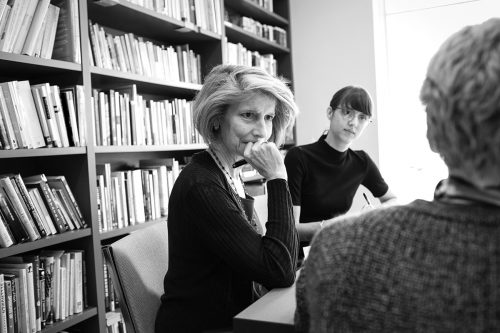
Katherine Spillar (left) meets with Michele Sleighel, national campus organizer and research associate for Ms. magazine (center), and Carmen Rios, digital editor for Ms. magazine, in the offices of Ms. magazine in Beverly Hills, California. Photo by Max S. Gerber
“Her first application to Baylor [College of Medicine] was rejected because they had already accepted six women into that medical school class, and they were not going to take any more,” Spillar said.
Hughes spent a year as a head nurse for Hermann Hospital in Houston and reapplied for admission to Baylor, this time securing one of those coveted slots.
In the early days of medical school, Hughes met Bliss Spillar, who like her was studying to become an anesthesiologist. They got married while still in medical school, eventually making their home in San Antonio, where they established the Spillar Anesthesia Group.
“My parents were very dedicated to having an egalitarian marriage, and they raised their two daughters and two sons with the same rights and opportunities,” Spillar said. “But the larger world in which I was growing up was not like that.
“I remember reading textbooks in grade school that showed the men as the breadwinners and the women as the caregivers,” she said. “That didn’t make sense to me.”
While Spillar cannot pinpoint a light-bulb moment that sparked her lifelong pursuit of gender equality, she does believe she discovered the word “feminism” during her time at TCU.
After graduating magna cum laude in three years with a degree in urban studies, Spillar went to work for the city of Fort Worth before returning home to San Antonio for graduate school. In 1978, she received an interdisciplinary master’s degree in economics and urban studies from Trinity University. Career opportunities lured her to Southern California in 1980, where she has lived ever since.
Leading the Feminist Movement
Almost four years to the day after she finished graduate school, the clock ran out on ratification of the Equal Rights Amendment. Spillar was at a rally in downtown Los Angeles when the historic bid met its official end on June 30, 1982. Thirty-eight states needed to ratify the amendment to add it to the U.S. Constitution. It fell three states short.
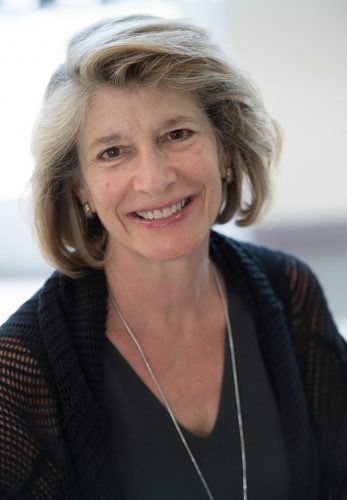
Several hundred TCU students, faculty and members of the community gathered for Spillar’s lecture, “Rise Up! Feminist Activism and Civic Engagement in This Political Moment.” Photo by Leo Wesson
“Section 1 of the Equal Rights Amendment says, ‘Equality of rights under the law shall not be denied or abridged by the United States or by any state on account of sex,’ ” Spillar said. “I remember thinking at the time, ‘How can this not win?’ When it came right down to it, we needed seven men in those three states for it to pass in 1982.”
Galvanized rather than crushed by the amendment’s defeat, Spillar dived headfirst into the feminist movement. The following year, she began four terms as president of the National Organization for Women Los Angeles, which at the time was the largest NOW chapter in the United States.
“Kathy has done so much as a leader, but one of her earliest victories was creating a clinic defense system to counter blockades at about 100 abortion clinics in Los Angeles and Orange County,” Smeal said. “She was like a general moving troops around, mobilizing 9,000 volunteers to escort women past the protesters.”
Smeal considers the Freedom of Access to Clinic Entrances Act, which Congress passed in 1994, a win for Spillar, who lobbied in favor of the federal legislation prohibiting anyone from physically blocking an individual’s access to a legal abortion provider.
“Kathy can manage people very well, and that makes her both potent and effective, as does her wide range of knowledge on the issues.”
Gloria Steinem
Over the next year, Spillar helped establish the National Center for Women and Policing. “This was soon after the beating of Rodney King, and it became apparent that we needed to work with police to hire more female officers, to take a hard look at police violence, and to help law enforcement respond more effectively to crime and violence against women,” Spillar said.
In addition to public policy issues, Spillar found a niche in organizing rallies and marches, including the April 2004 March for Women’s Lives in Washington, D.C., which The Washington Post reported drew between 500,000 and more than a million participants.
More recently, Spillar helped orchestrate marches around the country the day after President Donald Trump took the oath of office. On Jan. 21, 2018, on the one-year anniversary of Trump’s inauguration, Spillar was again at the center of the Women’s March in downtown Los Angeles. Spillar and her colleagues anticipated a crowd of around 75,000. The Los Angeles Daily News reported that 500,000 people joined the event, based on a crowd estimate from Mayor Eric Garcetti.
“One thing about Kathy is that she can get a job done,” Smeal said. “And her follow-through is magnificent.”
Publishing Powerhouse
So confident in Spillar’s abilities was Steinem that she entrusted her “baby”— Ms. magazine — to the care of Spillar and the Feminist Majority Foundation in 2001. Four years later, Spillar stepped into the role as executive editor.
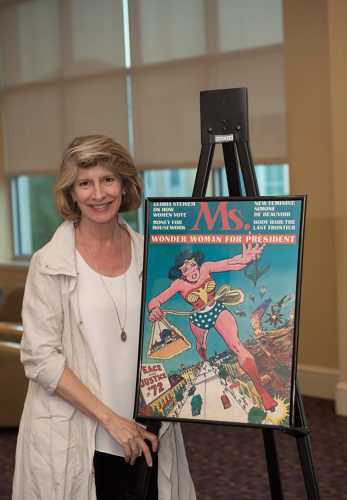
During a visit to TCU, Katherine Spillar said Wonder Woman made the cover of Ms. magazine’s first edition in 1972 because she represents “the use of power for good.” Wonder Woman returned to the cover to mark the magazine’s 45th anniversary. Photo by Leo Wesson
“Kathy is rare in being both an activist and a very good administrator,” Steinem said. “I, for instance, am not a good administrator. But Kathy can manage people very well, and that makes her both potent and effective, as does her wide range of knowledge on the issues.”
Steinem noted that Spillar has expanded the magazine’s reporting on international issues while also launching the successful “Ms. in the Classroom” program, a digital platform that brings the magazine to college campuses around the world.
The Ms. magazine blog attracts hundreds of thousands of readers a month, Smeal said.
Meanwhile, celebrities including Beyoncé Knowles-Carter, Meryl Streep and Oprah Winfrey have landed on the quarterly magazine’s cover. Wonder Woman, too. Steinem featured an illustration of the comic book icon on the inaugural issue of Ms. magazine in July 1972.
Fast-forward to Fall 2017 when Spillar put Wonder Woman back on the cover to mark the magazine’s 45th anniversary. “Wonder Woman has always represented the use of power for good,” Spillar said. “That is as relevant today as four decades ago.”
Making Time for TCU
Last September, Spillar was invited to the TCU campus for a public lecture, and she brought with her about 750 copies of Ms. magazine’s anniversary issue.
Several hundred TCU students, faculty and members of the community gathered in the Brown-Lupton University Union Ballroom for Spillar’s lecture, “Rise Up! Feminist Activism and Civic Engagement in This Political Moment,” which she gave as the Women and Gender Studies Green Honors Chair.
Bernice Ogbondah, a junior from Fort Worth majoring in journalism and minoring in political science with an emphasis on women and gender studies, appreciated Spillar’s singular vision: “It was riveting to have someone who is such a pillar of the feminist community speak with such passion about gender equality and voter rights.”
“I hadn’t understood her as a celebrity figure before we brought her to campus,” said Theresa Gaul, professor of English and director of the Women and Gender Studies program. “There was a woman who came up to me afterward to say she had the entire run of Ms. magazine. Students and members of the community were lined up to have Kathy autograph copies of the magazine.”
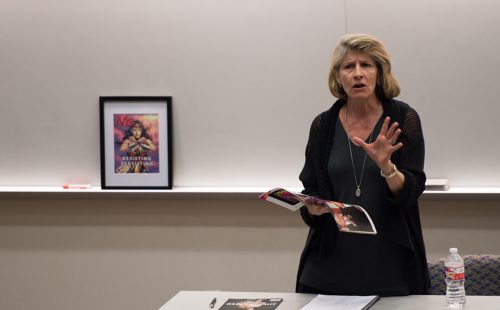
Katherine Spillar ’75 visits TCU as the 2017 Green Honors Chair for AddRan’s Women and Gender Studies program. Photo by Leo Wesson
Much of Spillar’s lecture focused on the 2016 presidential election. She examined everything from voter turnout by gender, race and education to the role of “dark money” and the media throughout the campaign.
Though disappointed with the presidential election’s outcome, Spillar pointed to what she views as positives in the aftermath. “There is no question that Trump and his type have galvanized new energy in the feminist movement,” she said. “His whole first year in office we have seen a backlash about his agenda — a regressive agenda on women’s rights, civil rights, human rights. Trump is fueling more demands for full equality, and that is a very good thing.”
Nino Testa, associate director of the Women and Gender Studies program, helped welcome attendees to the evening lecture. “You could feel the energy in the room as she spoke,” he said. “One of the common refrains throughout [Spillar’s] two days with us was the popularity of feminism. The numbers of people self-identifying as feminists is a lot higher than people might assume.”
During Spillar’s campus visit, she met with faculty members, sat in on classes and talked with students. “When I first sent her the proposed schedule, she came back to me and asked us to add more to her itinerary,” Gaul said. “She wanted to do as much while on campus as she could.”
Gaul estimated that around 600 people in the TCU community “interacted with Kathy directly, which is even more impressive when you consider that she is one of our most eminent and distinguished alumni. She couldn’t have been more supportive of what we are doing here.”
New Energy for Equality
About two weeks after Spillar’s TCU visit, The New York Times published its investigative report into the sexual harassment allegations against Harvey Weinstein, fueling the #MeToo movement, the Time’s Up initiative, and an ongoing national discussion about sexual harassment in the workplace.
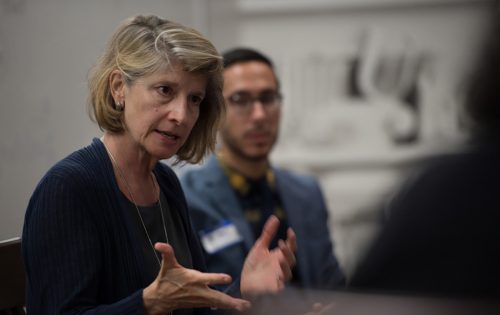
As the Women and Genders Studies Green Honors Chair in Fall 2017, Katherine Spillar met with faculty. Photo by Leo Wesson
With its Winter 2018 issue, Ms. magazine responded to the heightened focus on gender and power with this cover headline: “Smash the Patriarchy: The antidote to misogyny is a strong feminist movement.”
“Ms. magazine first put the issue of sexual harassment on its cover in 1977,” Spillar said during an interview in mid-January. “Gender balance in senior management and positions of power is the only real [solution to stop] sexual harassment. That alone would change the climate in a lot of places.”
Even though the entertainment industry was the epicenter of the current controversy, Spillar has worked on behalf of female hotel employees, farmworkers and even political lobbyists to end sexual harassment in their workplaces.
“One of the positive aspects of this current conversation and debate is that it has triggered a whole new awareness of the fact that women are underrepresented in positions of power in every single industry,” Spillar said. “Right now, women are energized, and the country is talking, which is essential for any true progress and change.”

Your comments are welcome
Comments
Related reading:
Alumni, Web Extras
TCU Magazine Podcast: Katherine Spillar and Carmen Rios
Ms. magazine put sexual harassment on its cover in 1977 and now the executive editor lends a hand to the #MeToo and Time’s Up movements.
Campus News: Alma Matters, Research + Discovery
Rosalynn Carter’s Southern Feminism
Religion professor Elizabeth Flowers explores the quiet fight for equal rights by the former first lady.
Alumni, Features
Trailblazer in nursing: Allene Parks Jones ’63
Allene Jones ’63 wasn’t making a statement when she enrolled at TCU, she just wanted a degree.